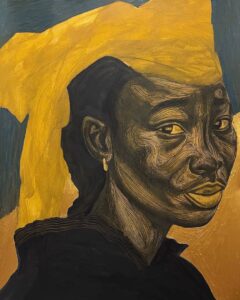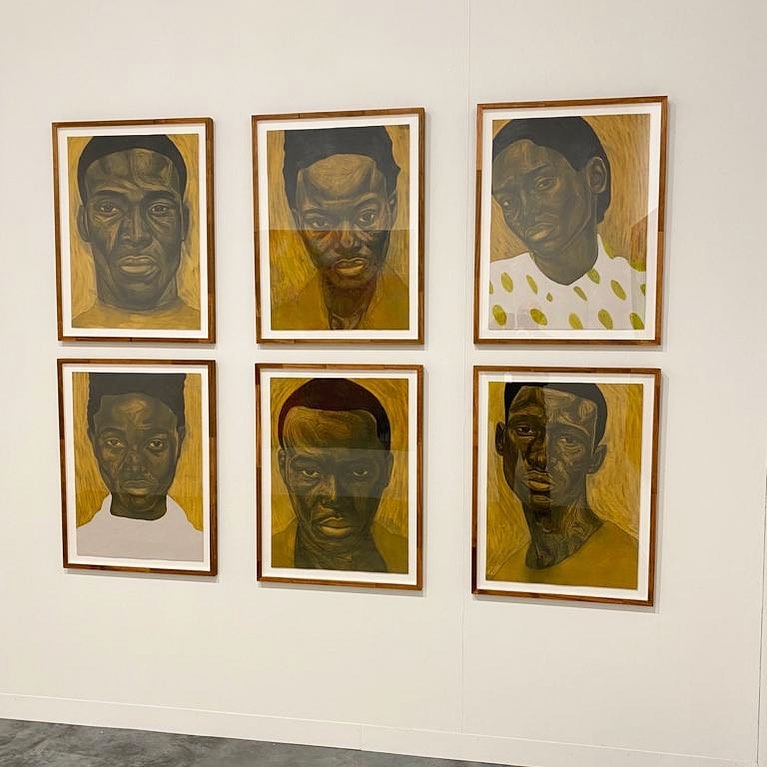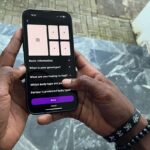A quiet sense of dignity fills the room of Studio Obijiaku, an art studio situated in Gwarimpa, in the north of Abuja. Human paintings depicting figures attired in colourful African fabrics adorn the walls of the studio. More than colourful paintbrushes on canvases, the details of the artworks portray a sense of rebellion against stereotypes that have bound the African identity for far too long. “For too long, we’ve been seen through the eyes of others,” says Collins Obijiaku as he studies the unfinished portrait of a young woman in a headgear. “I want my art to reflect who we truly are. Africans are not monolithic; we are not just symbols of hardship. We are complex, thoughtful, and deeply individual.”
Born and raised in Kaduna, northern Nigeria, Obijiaku found himself drawn to portraiture early in life. Today, his works are characterised by rich textures and intricate patterns that give expression to the nuanced emotions of his subjects’ faces and their experiences. When it comes to choosing his subject, Obijiaku is intentional: everyday Africans whose authenticity questions the often reductive narratives about this continent. “My goal is to show the world that African people are not trapped in one story,” he says. Sometimes this ambition is to capture the beauty of ordinary moments: a mother in quiet reflection, a young boy grinning from ear to ear, an elder lost in thought.

With a meticulous attention to detail, Obijiaku invites the viewers into taking a deeper look at the artwork, marked with a great sense of empathy and layered with rich, earthy hues. The subtle posture speaks volumes about confidence sans arrogance. His minimalist backgrounds offer an intimate, undistracted connection to the subject. “When people look at my work, I want them to stop and think,” he muses. “What they see on the canvas—whether it’s joy, sadness, or hope—is a reflection of the human condition, not just an African condition.”
After an exhibition of his painting entitled Unexpected Sittings in Los Angeles, Obijiaku returned home imbued with a renewed sense of purpose: to give back. This led him to set up Studio Obijiaku, both a gallery and a mentorship space where he coaches budding artists on infusing their African identities into their portraits. “Try and capture what makes them them,” Obijiaku charges his pupils as he walks around the room inspecting their work. “Don’t aim for perfection. Aim for truth.”
His mentorship seems like a masterful blend of technique and philosophy, as the students strive to find their voice and allow their identity to bleed into their paintings. “Collins pushes us to connect with our subjects in ways we never thought possible,” says Chika, one of several young artists under Obijiaku’s tutelage.
The results of this tutelage are masterful portraits of fathers, friends, and market traders all infused with an Afrocentric trait. Like their tutor, some of the youngsters have begun to accrue recognition in the art space, a feat that fills Obijiaku with pride. “There’s something powerful about seeing young Africans tell their own stories,” he says with a warm smile. “They’re not waiting for permission—they’re creating spaces for their voices to be heard.”
His portraits are not just visual representations of their subjects; they are emotional landscapes that reflect the complexities of human existence.
In one painting, Obijiaku portrays an older man in a threadbare cap and a weather-beaten face. Amidst his weary features is a sparkle in his eyes. “That’s life,” he says. “It’s messy, complicated, but beautiful. And that’s what I want to capture in every portrait.“.
Obijiaku thinks of his craft as a clarion call to African artists, urging them to take ownership of their narratives and move from preconceived notions towards nuances of truth. “There’s a global hunger for our stories,” he says, “but we have to tell them ourselves, on our own terms.”
Beyond his home country, Obijiaku is spreading his Afrocentric creed across international art spaces in New York and London. He sees a shift in how African art is viewed globally. “We are reaching the day when African artists are not considered ‘exotic’ anymore,” he notes.
Despite his growing fame, Obijiaku remains modest about his achievements. “This isn’t just about me,” he says. “It’s about us all: every artist, every subject, every viewer. We all have stories to tell, and those stories deserve to be heard.”
Back at Studio Obijiaku, young artists are immersed in their canvases, bridging cultures and connecting with the richness of African identity. There is a eureka moment as art bridges cultures and people across timelines.
Beyond portraiture, Collins Obijiaku’s work is a celebration of humanity, a stance against stereotypes, and an invitation to explore the depth and beauty of African identity. His influence helps reshape the African narrative, empowering the next generation to tell stories of authenticity, skill, and courage.
Collins Obijiaku, an artist based in Abuja, uses his art to challenge and reshape perceptions of African identity. His studio, Studio Obijiaku, is adorned with human portraits in vibrant African textiles, reflecting the complexity and depth of African individuals beyond stereotypical narratives. Born in Kaduna, Nigeria, Obijiaku focuses on capturing the authentic and thoughtful nature of everyday Africans, portraying them through detailed textures and intricate patterns that evoke deep empathy and reflection. He aims to move beyond simplistic depictions of Africa, demonstrating through his art that African lives are multifaceted.
Through his mentorship program at Studio Obijiaku, he encourages young artists to imbue their work with personal and cultural authenticity, prompting them to go beyond mere perfection and strive for truthful representation. This philosophy has sparked recognition for his students, who are beginning to gain acclaim in the art world. Obijiaku’s work extends globally, as he promotes African art in international venues, countering the exoticism often attached to it. Despite his success, he remains grounded, asserting that the narrative of African art should be self-directed and authentic.
Obijiaku's artwork is not just visual; it's a narrative of life's complexity and beauty, where each portrait invites viewers to see the joy, sorrow, and humanity within. His ethos – capturing the essence of life’s paradoxes – echoes a broader clarion call for African artists to take charge of their stories. By doing so, he empowers them to convey the rich and diverse African experiences, facilitating a broader understanding and appreciation across cultures and timelines. His work is a celebration that transcends mere portraiture, driving a conversation about identity and human connection.






